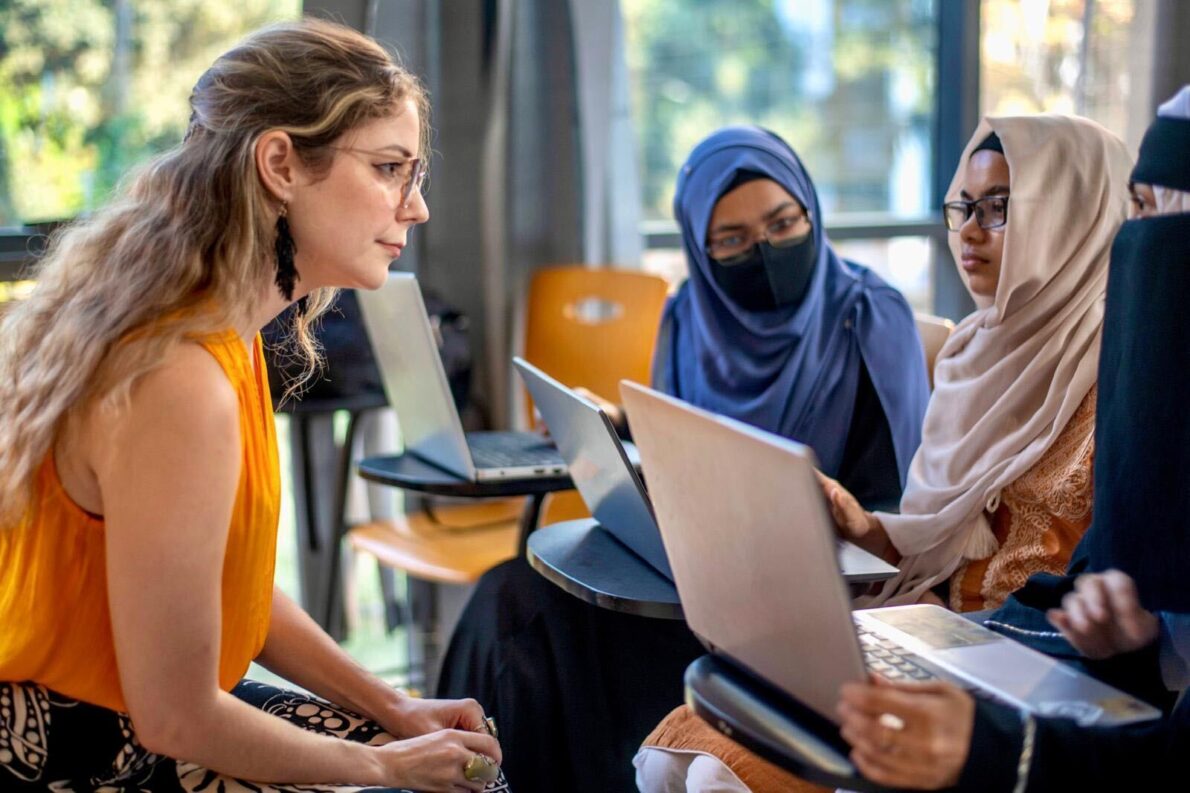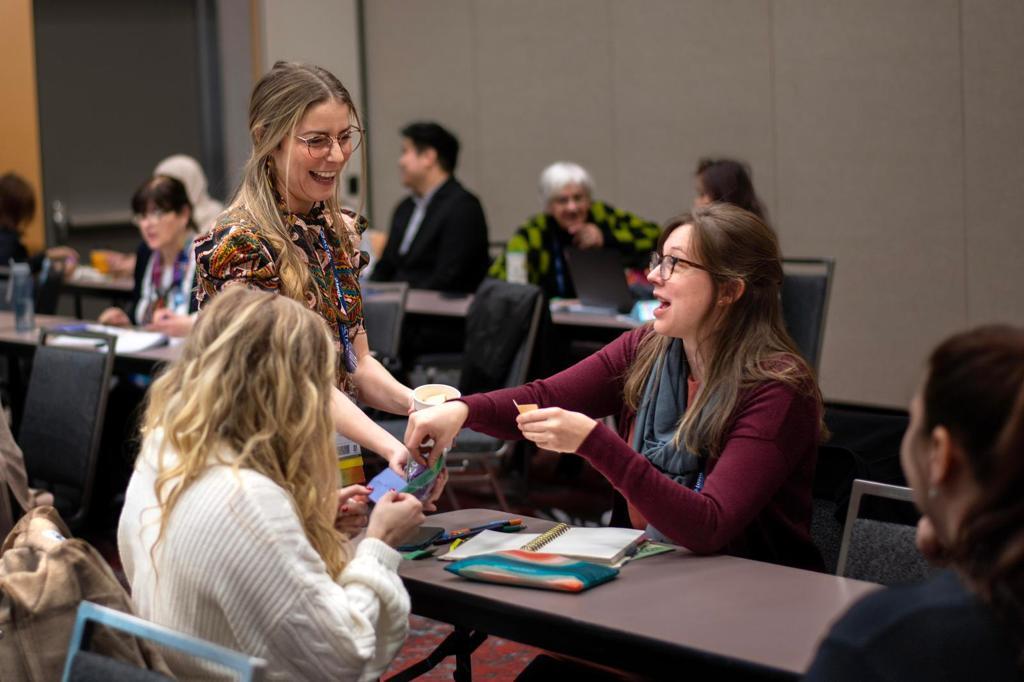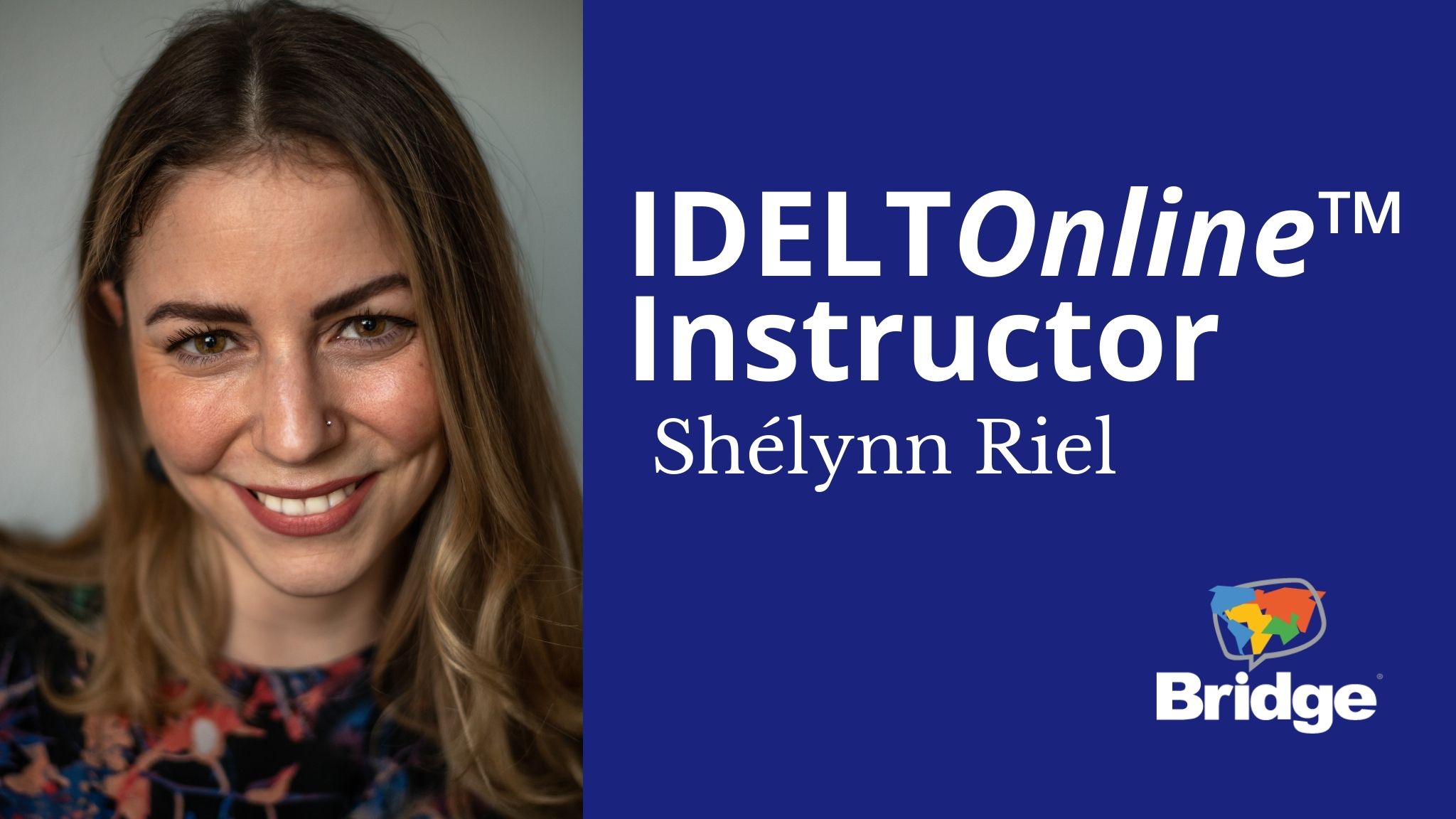Drawing from her extensive experience as a university academic English instructor, program director, and teacher trainer, Shélynn Riel is a Bridge International Diploma in English Language Teaching (IDELTOnline™) instructor and Expert Series moderator with a wealth of knowledge and advice to share with the program’s trainees. In this interview, she shares how her language learning and English teaching journey steered her to the teacher training path as well as tips on how students can get the most out of the IDELTOnline™ program.
What inspired you to get into the English language teaching field?
It all started when I began studying languages myself. I grew up in a monolingual household in a very white suburban town. I first started studying the Spanish language when I was in seventh grade, and I remember being completely taken by the process of learning a language, of having this ability to communicate with people I wouldn’t normally be able to communicate with.
From the beginning, I was hungry for more. I loved studying the different dialects of the Spanish language and the different cultures of many Spanish-speaking countries. So, I threw myself into learning the language and communicating with people around me. I also worked as a server in many restaurants throughout my young life, and I loved being able to communicate with my Spanish-speaking co-workers.
The teaching part of it came a little bit later. I thought I wanted to teach the Spanish language – that was sort of my goal once I learned the language. I first worked as a literacy interventionist for second and third-grade, emergent bilingual kids in the city of Providence, Rhode Island. I would go into students’ homes after school to help them with their literacy homework. Most of the families were Spanish-speaking, so I would sit with these kids and their relatives who were home every night. They were very eager to learn English, soaking in the language like sponges.
Although I knew that working with kids was not for me, I loved engaging their adult family members. That’s when I decided to use my Spanish skills for a different cause and work with adult learners of English in the community who needed English to improve their lives in various ways. It was the best of both worlds for me.
My first jobs teaching English to adult learners were within community-based settings. For example, I worked with asylees or refugees in the city of Providence. Soon after, I moved into the academic realm and started teaching in intensive English programs. This has been the fight of my entire career: deciding between teaching in community-based programs, which have my heart, and working within a university setting, which I’ve always appreciated for the rigor and the different motivations learners have.
Read about Bridge Expert Series Webinar Moderator Shélynn Riel.

What led you to your new position as an IDELTOnline™️ instructor?
Many different paths have converged and brought me to this new position. I’ve been working with English learners in a formal education setting for about 15 years, in addition to one-on-one tutoring. Then, in 2017, I shifted to spending most of my time training teachers.
I was awarded a Department of State fellowship through the English Language Fellows program and was situated in Mendoza, Argentina for ten months. I worked at the Binational Center in Mendoza, where the goal is to foster intercultural understanding and exchange between the U.S. and Argentina. My job there was to work with 50 in-service teachers; some of them were brand new to English teaching, some of them had been teaching for 30 years, and some of them were right on the cusp of retirement. It was an incredible experience to work with and learn from them!
Throughout my career, I’ve also facilitated digital exchanges with teachers from all over the world, working with as many as 40 teachers at once. I had to look at questions related to digital and global citizenship, how to prepare students to be digitally literate, and how we, as teachers, can demonstrate digital literacy.
I have also been the moderator for Bridge’s Expert Series webinars for almost a year and a half now, as well as a writer for BridgeUniverse for almost three years.
How has your experience in English teaching helped you as a teacher trainer?
I always say that if you’re a teacher trainer, it’s important to continue to teach and to be involved in the classroom in some capacity because the two do inform each other. I’ve worked in diverse environments in the U.S. and abroad. As I mentioned earlier, I’ve worked in community-based programs, with new arrivals, pre-literate people in their native languages, learners who are preparing to become pilots, lawyers who need English for very specific purposes, and more.
Emphasizing the need for continuous professional development and practice
As I’ve done a lot within many diverse environments, I also think it’s really important to continuously develop yourself as an educator. I have a podcast devoted to reflective pedagogy that encourages teachers to consistently take the time to reflect on their teaching practices, an essential process that helps teachers grow in their profession. Not only has the experience solidified the knowledge I carry with me, but I think my growth mindset and focus on being a reflective practitioner support me as a teacher trainer. It’s something I practice as a teacher trainer and pass along to trainees and teachers I’m working with.
Additionally, I think if we look back at our foundational training as teachers, whether it’s an initial TEFL certification or a master’s program, we’ve all had those professors who have seemed a little bit out of touch. Theory is important as it guides what we do in many ways, but the practice is the other half. You can’t have one without the other. So, you need to constantly be exposing yourself to the reality of classrooms.
Learn about leveling up your professional development with Bridge Expert Series webinars.
Sharing real-world experiences with trainees
Finally, trainees appreciate when their trainers have some environment and experience they can share with them. When students say, “My students are doing this” or, “How can I most effectively teach?” then, I can say, “Well, I’m actually doing that this week,” or, “Here are the ways I’ve tried to expedite that process within my own classrooms.” So, having that immediate connection is useful as a teacher trainer. I also love to use my current classroom as a case study for my students within the certification training programs. I can pull examples and say, “This is what happened in my class today. Why do you think that is? Is there anything in the literature that explains what happened today?”

What are the common motivators for students who take the IDELTOnline™️?
Our diverse IDELTOnline™ trainees have diverse needs, which is something I love about teaching it! Although there are a lot of different motivators for students taking the IDELTOnline™, I have found that everyone is laser-focused on gaining the skills and information they need from the course. Some of the trainees and their motivations I’ve seen include:
-
New or aspiring educators looking to teach abroad. They are looking for an initial TEFL/TESOL certification that can help them get a job.
-
Seasoned educators from the U.S. looking to shift from teaching English as a second language to teaching English as a foreign language. They want to move abroad and use those skills. Some of them are also just trying to see how TESOL and TEFL are different.
-
Experienced educators looking to add new or specific skills to their CVs. So, maybe a teacher who’s been teaching science at the high school level for 30 years has decided to go back and understand what teaching English is all about or maybe use it to support teaching science as a content area.
-
Experienced teachers who work with a lot of learners who speak English as an additional language looking to gain skills to better support their students.
What are you looking forward to the most about teaching the IDELTOnline™️?
First, there’s such diversity in the program trainees. When I say diversity, I mean not only a country of origin or linguistics but also motivations to participate in the program. I really appreciate heterogeneous populations because I think it creates a bit more of a challenge for me as the trainer and keeps me on my toes. The diverse backgrounds of the students also relate to a second thing I look forward to, which is discussing the value of teaching English as a global language.
Advocating for English as a global language
I look forward to facilitating conversations on the use of English as a global language with my native English-speaking teachers. As a native English speaker myself, I understand that we carry a privilege and we need to recognize that in our teaching, particularly if we’re looking to teach abroad.
Historically, programs have sought out native English speakers, either coming from the U.S. or the U.K. because they believe that those are the standard versions of English that should be taught. However, times have changed. English is spoken by billions of people now and for that reason, we need to be thinking about English as a global language.
This requires a different thought process and framework as you enter the teaching environment. This means honoring the different varieties of English we see within our classrooms, rather than reinforcing harmful and antiquated ideals. I think it’s a great opportunity (and a critical moment) for us to reflect on our identities as teachers of English as a global language and the implications within our teaching practices.
How do you manage your workload with so many trainees and courses?
It can be a challenge! I’m a freelance teacher and freelance teacher trainer, so I wear a lot of hats, often several on any given day. That also means having to be a time management expert above all else. A few strategies that help me with this have been:
-
Chunking my schedule into time blocks. Doing this ensures I’m prepared since I often have several competing priorities.
-
Scheduling my tasks based on my energy level and the kind of energy I have. This can be as simple as asking oneself, “Am I a morning person or do I work best in the afternoon or evening?”
-
Scoping out the day to pair intensive tasks with less intensive ones. On a given day, I may have meetings, a teacher training session, and a webinar to moderate. When I have a lot of back-to-back meetings, for example, I find it’s better to pair those with smaller tasks like responding to emails or giving feedback. I reserve the deeper planning activities for days I’m not teaching and have larger chunks of uninterrupted time.
-
Looking ahead to schedule planning times for different activities. I may need to prepare for a lesson on research writing and prepare to moderate a webinar. Considering prioritization needs, time commitment, and mental energy needed helps me schedule the best times for these tasks.
Read about five tips for creating your ideal online English teaching schedule.
What do you enjoy doing in your free time?
I start every day with some sort of movement. It’s the way that I get my brain and my body synced up. I think that a lot of us, especially freelancers, are taking on more than we can chew. But I think that having a connection between the brain and body is important. Your physical health and energy levels impact how your brain functions. So, I start every day with either yoga or Pilates, or both if I have time.
I also love exploring nature! I have a travel trailer I can connect to my SUV, and I love to explore national parks. I also love slow travel and spending time with my family and friends. Recently, I’ve also taken up watercolor painting. I’ve been trying to build up my list of hobbies and not just let my teacher identity be everything that I am.
Read about maintaining work-life balance while teaching online from home.
What are your top tips for IDELTOnline™️ students?
-
Look ahead. You don’t have to be surprised by the class content. You can get an overview of what you’re going to be doing for the week. Spend some time with the syllabus upfront to understand how you’re going to be moving through modules.
-
Take some time to organize your calendar. Treat this program like a job. As adults, we have competing priorities. It’s important to see how this course is going to fit into your life. You’re already in the program, so you see the benefit of being here. Make your time in the course count. Be sure to not only schedule your life around the class but also schedule the class around your life. I believe in work-life integration, and I think discipline is a big part of any continuous professional development. Figure out when it’s going to be the best time for you to work within this course and then stick to it.
-
Though this program is like a job, it’s also a journey. Be curious, open, and inquisitive. I always tell my students, “You learn so much from your peers. You’re not just listening to what your teacher has to say; you also benefit from being exposed to all of the people around you.”
-
Finally, you get out what you put in. Especially in an online learning environment, it is easy enough for you to do the bare minimum and still get the certificate. But if you’re participating in this program, there is some sort of motivating factor. Most trainees have a passion for helping people and supporting English learners. Tap into that. If you want to just do the bare minimum, just know that you’re going to get the bare minimum out of it. But if you engage every week on every discussion post, take time to mark up the readings, and respond to your peers comprehensively, you’re going to walk away from this experience with so much more!











